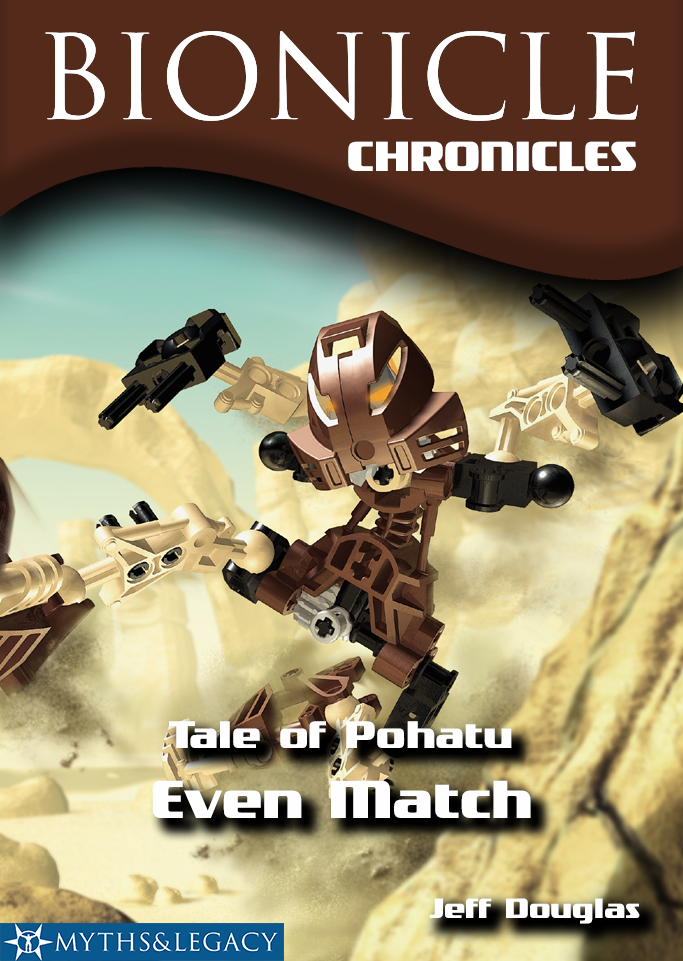
Myths and Legacy
Tale of Pohatu: Even Match
Written by Jeff Douglas
Pohatu crunched through the dense snow, wary of the slippery ice beneath his armored feet. Pausing to catch his breath, he raised a hand to block the sleet as he gathered his bearings. But it was no use.
Not long after the Toa had parted, Pohatu had returned to his village to see if the villagers could point him in the direction of any unclaimed Great Kanohi. After noting their recommendations, Pohatu found himself wandering in the direction of Ko-Wahi. Perhaps if he was lucky, the Toa of Stone thought, Kopaka would be easy enough to find and they could work together. They’d proven quite a capable team already.
By now, however, Pohatu had spent an hour wandering the snowbanks when a snowstorm materialized out of nowhere, sending blinding sleet and reducing visibility in all directions. While the Toa of Stone suspected Makuta could have had a hand in the freak occurrence, Pohatu was still fairly new to the island and didn’t have a sense of what was natural and what wasn’t.
Well, I’m on an island, Pohatu thought, frustrated. If I pick a direction and go straight, I’m bound to get out eventually.
With new resolve, the Toa confidently marched forward ten paces before hesitating.
Or, would the left be a better option? he wondered, shivering. He looked around. Or the right…?
Dismally, he turned to look in the direction he had come. But it was no use. His tracks were scarcely visible anymore.
Not for the first time, Pohatu wished he could race out again with his Kakama. But with no sense of where he was going, nor any capacity to prevent from slipping on ice, it would be foolish.
He had dug his grave. Now he’d have to lie in it.
Shivering and clutching himself, he pressed on through the thick snow, against the biting wind. Although optimism came naturally to him, there were times when he legitimately worried. A minute seemed to last for hours, and hours stretched on for years. How Kopaka could survive, much less thrive in this harsh, unforgiving landscape was—
Pohatu stopped. Were his eyes playing tricks on him?
No, they weren’t. A stone’s throw up the mountain, he could see a red flag flapping in the wind.
Shuffling awkwardly through the drifts, he made his way over. As he approached the flag, he surveyed the region to see if he could spot another. And, to his excitement, he did.
I told you we’d make it out, Pohatu told himself. I don’t know why you didn’t believe me.
Getting there was much harder than it looked, however. But now he had a goal in mind. This time there was a destination.
In this way, the Toa of Stone navigated from one flag to another, following along some invisible path to an unknown destination, trusting in its direction for the lone reason that some other intelligent being had seen fit to mark it. It could have led to Makuta’s lair for all Pohatu cared, so long as he got somewhere.
“Looking for something?”
Pohatu almost jumped out of his armor. A single, lone Matoran merged from a hidden bunker in one of the snowdrifts. He was clad in a light blue Akaku and white armor.
“I’m Matoro,” the Matoran greeted. “You are Pohatu, Toa of—”
“Stone,” Pohatu finished sheepishly. “Which means I’m a little out of my element here.”
“Come, Toa. I will take you somewhere warmer,” Matoro said, taking his hand and leading him off.
✴ ✴ ✴
As they walked, the Ko-Matoran explained that he had been refereeing nearby when Pohatu had unwittingly set off one of his tripwires. As he spoke, the Toa observed an element of wisdom deeper than most others he had met on the island thus far, save for the Turaga. Consciously or not, Matoro spoke to Pohatu less like some deity incarnate as other Matoran did and more like a peer, and one capable of making mistakes. The Toa didn’t know much about this villager, but something about him set him apart.
“What were you refereeing?” asked Pohatu.
“Huai Snowball Sling,” Matoro explained. “I’m not an athlete, so I have never done much playing. But the others trust me to arbitrate.”
“Do you have much experience with that?”
“Only what I’ve learned from the Turaga,” Matoro shrugged. “Our elder has placed great faith in me, and I strive to live up to his expectations.”
“I see,” remarked Pohatu.
As they spoke, Matoro had led them both down a low path into a valley. Although the change had been gradual, the winds were abating, blocked by the towering mountains, and the snow was letting up. And as the pair rounded a bend and came within view of an ice field, the atmosphere was comfortable, if still chilly.
Several players were on the field, and as the Toa of Stone came into view they stopped what they were doing and looked up. Matoro brought the delighted Pohatu to the center of the field and the Matoran crowded around.
“Looking for a Kanohi, great Toa?” one asked.
“What brings you to our field?”
“…”
“Be honored,” Matoro smirked. “This is more than you’ll ever hear from a crowd of Ko-Matoran ever again.”
“I’m looking for a Kanohi mask,” Pohatu explained. “I’ve been told there may be some out here to be found.”
“Ko-Wahi holds its share of secrets and hidden masks,” Matoro replied. “But surely you’ve earned a moment of respite?” He gestured to the field.
Pohatu was taken aback. “You… Wait, you want me to play with you?”
“I would invite Kopaka,” Matoro chuckled, “But he doesn’t seem one for games. Perhaps you are different.”
“I’ve watched a few Koli matches, but I’ve never played. There’s little point if I’m holding back.”
Matoro placed a snowball in Pohatu’s hand. “Then don’t hold back. Use every power at your disposal.”
The Toa stared at the curious Matoran, wondering if the Matoran was simply unaware of the legends of the Toa. Was this why he had spoken so plainly before? Did he not know the full range of a Toa’s power? Or did he not know of Kanohi masks?
There was no way he could be ignorant of these. Not if he was Nuju’s attendant.
Pohatu walked onto the field, but he resolved not to use his powers, if only to keep things more fair. Matoro quickly explained the rules: fling snowballs and avoid being covered in snow.
Preparing his first several snowballs, he crouched in his corner and waited.
A shrill horn signaled the start, and the other players leaped from their corners. Pohatu trotted out of his corner and took aim, but he’d scarcely taken three steps before, the snowball was smashed out of his hand and three balls had landed square in his torso. Nor did the snow fall off, however, for the snow was sticky and clung to him closely.
Now Pohatu was starting to understand. As he saw the Matoran hurling snowballs at each other, he realized it clumped on and held, forming layers upon layers. The thicker the snow got, the harder it got to move.
Not that movement was easy as it was. All movement produced friction on the ice, forming a slick layer of moisture on top of the already-slippery surface. Every action Pohatu took propelled him in the opposite direction, no matter how softly he acted.
It was when his right leg was almost too heavy to move easily that he started to be concerned. Drawing on his wells of strength, he took a step forward, but the weight in the air unbalanced his left leg, and it slipped out from under him. He fell flat on his face.
Sensing opportunity, the Ko-Matoran circled around, hurling snowball after snowball until the bulky, heavy Toa was a mound of limbs and snow. Pohatu grunted with frustration.
The game continued, but as the Matoran glided up and down the ice effortlessly, Pohatu worked to lift his hefty form off the ice. Each time he nearly stood on his two feet, he lost friction and slipped. Incredibly the ice never cracked under his weight.
He was still on the ground by the time the game ended. Two of the other Matoran had been so thoroughly pounded by snow that they resembled miniature snowballs themselves and were rolling around trying to right themselves. Matoro ambled over to Pohatu, helping him up and guiding him back to the edge.
“You didn’t use your powers,” the Matoran remarked. “Why?”
“They’re not fair,” Pohatu replied. “Not when the other players don’t have access to them as well.”
“When you face Makuta, will you worry about playing fair?”
The Toa of Stone started. Looking at the Ko-Matoran, he frowned. There was more to this villager than met the eye.
“Ko-Matoran aren’t Makuta.”
“No,” Matoro shrugged. “But they’ll make good practice. Toa Pohatu, these Ko-Matoran have spent many years perfecting their mastery over the sport. Learning to master the ice. You have not had this experience, but you fear having an unfair advantage? I think their powers are greater than yours.”
Pohatu opened his mouth to respond, but then he shut it. It was the last thing he would have expected to hear.
Before he could respond, there was a light twing nearby. Matoro frowned and looked in its direction.
“One of my tripwires,” he remarked. “Something is coming.” He looked at Pohatu. “Did you bring company?”
“No.”
✴ ✴ ✴
Pohatu and Matoro sat positioned in one of Matoro’s bunkers, making their way to it through some tunnels and trenches hidden among the snow. Matoro explained that he and other Ko-Matoran trappers had a number of outposts hidden along the mountainside. This one was especially important for protecting the distracted Huai players below.
“From what?” asked Pohatu.
Matoro pointed into the tundra. “From something like that.”
The Toa looked—and immediately wished he hadn’t. It was a hulking monstrosity, one of the largest creatures he had ever seen. It was a lean, teel reptile with powerful boxing arms and thick treads.
“It looks like something Gali described,” Pohatu murmured. “Something she faced off the coast.”
“A Tarakava,” Matoro muttered, “But no ordinary Tarakava. This is the King of Lizards. The Tarakava Nui.”
“Are Tarakava common here?”
“In this region? No. Makuta’s influence is at work, driving it up here after you.”
Matoro started to climb out of the bunker, but Pohatu held him back. “Let me.”
“I honor your courage, noble Pohatu, as all Matoran do,” Matoro replied. “But the tundra is familiar to me, where you are still getting accustomed to it.”
“That is one thing the Rahi and I have in common,” the Toa of Stone winked.
Crawling out of the bunker, Pohatu raised himself to his full height. His brown armor against the white backdrop immediately caught the attention of the lizard who snarled and lunged for him. Pohatu activated his Kakama and shot out of the way, and the powerful forearms of the Rahi cracked the ice where he had been standing. The Tarakava Nui roared.
The Toa felt the earth. Although much of Mount Ihu consisted of pure ice, he could sense pockets of stone giving the mountain its shape. If he could tap into those—
The Tarakava Nui’s treads whirred, and it barreled forward, hurtling toward Pohatu. The Toa responded in kind, darting out of the way as the Tarakava Nui spun before hitting a snowbank, kicking up a spray of snow beneath its treads. Pohatu almost felt bad for the creature, and it almost felt unsportsmanlike to—
The Tarakava Nui raced forward, locked one of its treads, slid and spun sharply in the ice, kicking Pohatu’s feet out from under him. The Toa landed hard, where the Rahi righted itself fast and brought a powerful arm down. Pohatu barely moved his head in time, but the ice where it had been split in two. So powerful was the attack from the Tarakava Nui that Pohatu was certain it could kill him.
The Toa scrambled to his feet. Although he couldn’t see Matoro from under his cover, he could hear his words. You fear having an unfair advantage?
“Very well,” he muttered. “Have it your way.”
Summoning his powers to bear, the Toa called on his powers for something he had never tried before — directing the element of stone to vanish from everywhere except directly beneath his feet. Reaching deep into the mountain, he willed it to part as a giant hollow chasm tore open beneath the ice. The mountain rumbled and shook, but on the surface there was no evidence of change.
The mutant Tarakava struck at Pohatu, but the Toa leaped vertically off his stone platform and landed on the Rahi’s forearms, slamming them hard into the stone. The Rahi roared in pain, swiping at him, but Pohatu pulled the stone slab up, again inflicting tremendous agony.
The Tarakava Nui had had enough. Spinning its treads in the snow and ice, it lunged forward at Pohatu, but the Toa was ready. With a powerful kick to the slab, the stone crumbled and disintegrated, revealing a hole into the gaping chasm Pohatu had formed. As the lizard rushed toward him, the Toa roundhouse kicked the Rahi into the hole.
The Tarakava landed on the target, but its powerful forearms held it aloft. With calm resolve, Pohatu curb-stomped the Rahi into the deep pit where it roared in anger.
Matoro climbed out of the bunker and walked over. For a moment, the two of them looked silently down at the protesting Rahi, slamming its powerful arms helplessly against its tight confines.
“You will master the art of Rahi-trapping yet,” Matoro remarked finally. “We were able to subdue the Kane-Ra you and Kopaka fought before. Before all the Matoran were able to do was drive it off. Now we can confine it until Makuta’s spell on it is broken.”
“A spell that will be broken soon enough,” Pohatu remarked.
“Indeed. Look, you’re one step closer already.”
The Toa turned. Matoro’s arms were outstretched, and in his hands rested an Akaku.
“Nuju wanted me to give it once a Toa learned the lesson of Huai,” the Matoran explained, a soft smile accentuating his own Akaku. “And while you haven’t yet won a game, I feel you have learned its lesson.”
Pohatu reached out to take the mask. But then he pulled back and began walking down the slope.
“Not yet,” he grinned. “If I’m going to win it, I’m going to win it the right way. Let’s hope those Ko-Matoran are ready for a Toa of Stone.”
Matoro looked in the direction of Ko-Koro, then at the struggling Tarakava Nui, who was rapidly expending its energy. With a quiet chuckle, he started after the Toa.

